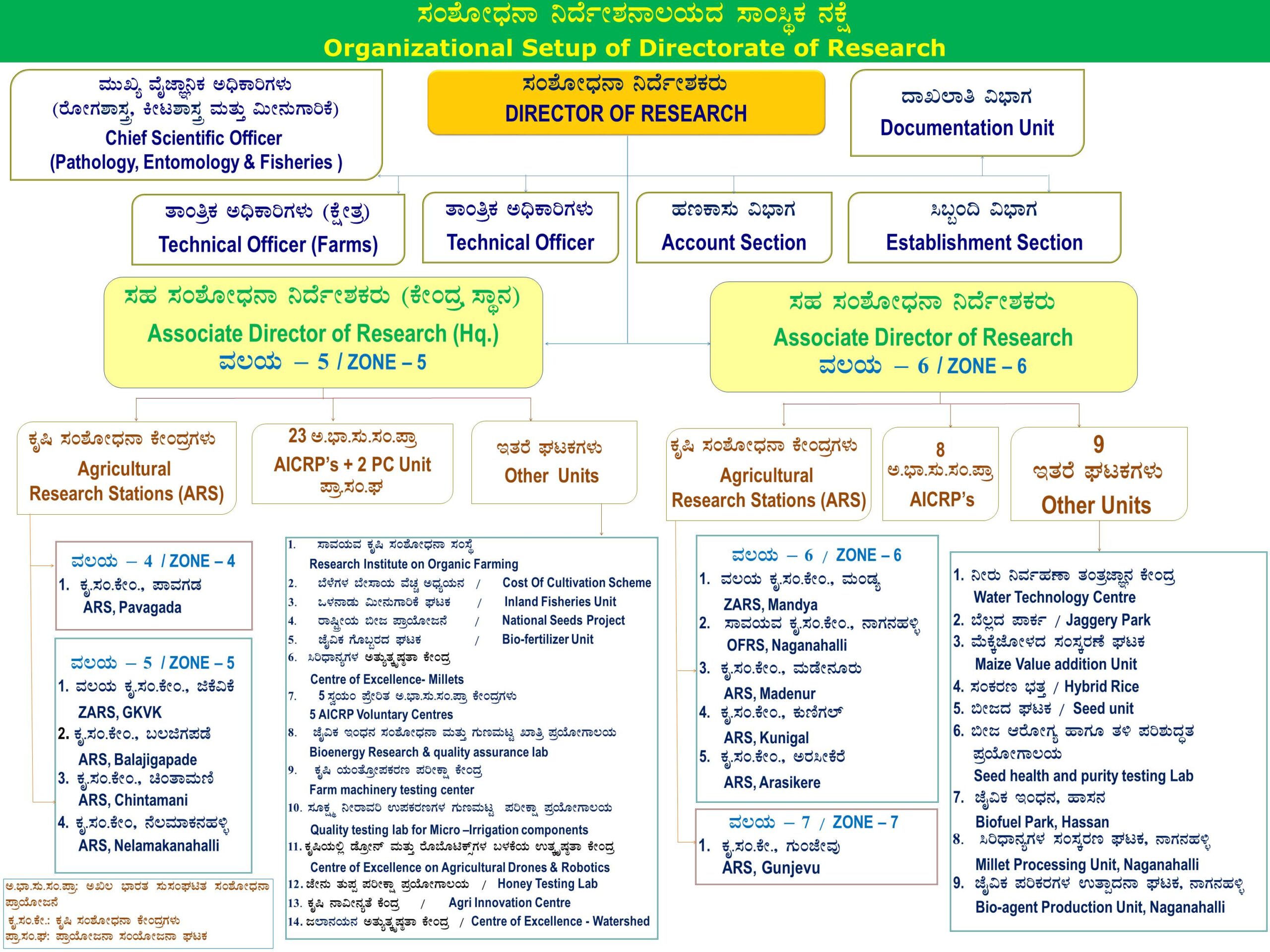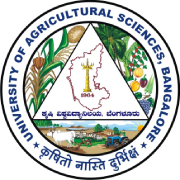
Dr.H.S.Shivaramu
GKVK, Bangalore-560 065
Agriculture in the State is dominated by small and marginal farmers, who have small holdings. Raising productivity is likely the single most important factor, if income of this group is to be doubled. The research in UAS, Bangalore has a vision to generate cutting edge farm technologies for transforming agriculture to make it profitable for the farmers and to meet the growing demand for food.
The University also coordinates location specific, strategic and anticipatory research programmes in 12 Agricultural Research Stations situated in 10 Southern Districts of the state, mainly to address the location specific problems of farmer to improve their standard of living while ensuring food security by enhancing productivity and enhancing agricultural resources efficiency with no adverse effects.
Adaption of varieties / hybrids as well as new production technologies developed by the University can potentially strengthen farmers cropping systems by increasing yields, improving drought resilience, boosting resistance to pests and diseases and also capture new market opportunities. University is the pioneer in developing the first inter-specific cotton hybrid to be released anywhere in the world while UASB is the first in the country to develop Paddy: KRH-1 and Sunflower: BSH-1 hybrid. Since inception (1965-2024), the University has released 289 high yielding crop varieties viz., Cereals & Millets (128), Potential Crops (5), Pulses (54), Oilseeds (28), Commercial crops (31), Horticultural Crops (32) and Fodder crops (11), 36 hybrids in different crops viz., Paddy (3), Maize (7), Sorghum (3), Chickpea (1), Sunflower (10), Castor (3), Cotton (3), Potato (1), Chilly (1) and Fodder (4) and 7 animal breeds viz., Sheep (1) and Poultry (6). In a vast repository of 325 varieties/ hybrids developed by the university, we at present have commercialized 10 varieties and 9 hybrids.Since inception (1965-2024), the University has released 31 hybrids, 286 high yielding crop varieties and 7 animal breeds viz., Cereals & Millets (125), Potential Crops (5), Pulses (53), Oilseeds (27), Commercial crops (31), Horticultural Crops (31) and Fodder crops (11), in different crops.
A basket of more than500 sustainable farming technologies developed by the University have transformed the landscape of the rainfed agriculture in Southern India by ensuring livelihood of farming community. Production technologies developed for dry land agriculture have helped in stabilizing farm productivity even in sparse rainfall years. UASB has also developed several low costs, eco-friendly technologies for managing pests and diseases. Several new value-added technologies are being developed. The dissemination, transmission, evaluation, and fine-tuning of the technologies in close collaboration with farmers and other stakeholders are the subject of concerted efforts that are continuously improved.
Communicating effectively to formers and stakeholders as well as the general public the available technology interventions will always be, a key priority of the Directorate.
The University website has the information about the Directorate, its activities, accomplishments, and initiatives. You will find here the Directoratesvarious publications, projects and programs and contact information of all our research stations andproject implementing units.
Mandate
UAS takes pride in not only providing exceptional academic programs, but also exposing students to the research process by inviting them to participate in project teams lead by internationally recognized faculty. Students are encouraged to get out of the classroom and into the field, the greenhouse, or the lab, where they experience the excitement of discovery while translating knowledge into action. Through outstanding and innovative research programs, UAS faculty, staff, and students are tackling today’s biggest issues in Agriculture health, the economy, and the environment; they are making a difference.
Vision
Focus – University as most successful SAU in the country in conducting apt basic and applied research orienting towards livelihood security of Farmers.
Mission
Emphasis on participatory On-farm and on-station research on contemporary issues for increasing agricultural productivity and food security, Nutritional security besides protecting the environment in the region.
Organisational Chart
The University is catering to the research needs of 10 districts of Southern Karnatakacoming under the jurisdiction of UAS, Bangalore comprising Eastern dry zone (Zone 5), Southern dry zone (Zone 6) and parts of the Central dry zone (Zone 4) and Southern transition zones (Zone 7). The Director of Research is responsible for the due performance of the research stations as well as planning, coordinating and monitoring research in the University. A multi-tiered arrangement involving zonal stations, extension specialists and teaching departments within the University, linkages with other research institutions in the zone, line departments, progressive farmers and agri-entrepreneurs provides operational framework for formulating relevant research agenda.
Directorate of Research is headed by Director of Research assisted by two Associate Directors of Research (ADRs) functioning at Directorate of Research, GKVK, Bengaluru and ZARS, VC Farm, Mandya. The Associate Directors of Research monitor the Agriculture Research Stations and research projects (AICRPs and externally funded) functioning in their operational jurisdiction.
ADRs of each zone facilitate Director of Research in co-ordinating regular on-going research activities of the university and establishing close linkage between line departments in identification and prioritisation of location specific research needs, formulation and implementation of suitable technical programme and overall monitoring of research programme of the scientists working in the zone to achieve the identified mandates. In addition, the scientists will be motivated to develop collaborative research projects for external funding to meet the research gaps.
Each Agricultural Research Station is headed by a Senior Scientist / Farm Superintendent and All India Co-ordinated Research Projects (AICRP) areled by Scheme Heads. The Director of Research is technically assisted by Chief Scientific Officers, Technical Officers and Documentation unit.The detailed pictorial representation of operational setup of directorate is given in the Figure.

Research Co-ordination mechanism
The Director of Research with the assistance of Zonal ADRs, Chief Scientific Officers, Technical Officers will coordinate, monitor and evaluate all the research activities including All India Coordinated Research Projects and all externally funded research projects. Teaching, research and extension faculties of the university who are involved in research are annually brought together through Zonal Research and Extension Programme (ZREP) Workshop. The results of the previous year’s research programme viz., variety release proposal / new farm trials/ multi-location trials (MLT)/ technologies for inclusion in Package of Practices / patent / technologies for commercialisation and technical programmes (new, ongoing and concluded) conceptualized during the current year are discussed in the annual technical meets of all the disciplines conducted by respective University Heads are presented, discussed and recommended in the ZREP workshop. The Zonal workshops, conducted annually which is attended by Vice-Chancellor, Director of Research, Director of Extension, Deans, ADRs, ADEs, Heads of the departments / University, Officers of State Developmental Departments, all the scientists, representatives from other related institutions, progressive farmers and representatives of corporate sector engaged in agri-business / industry.
On approval of Research Council, the newly released varieties and other technologies approved in ZREP workshop will be recommended for inclusion in the Package of Practices of the University. New technical programmes and MLTs will be implemented at ZARS/ ARSs while Farm Trials will be conducted in the farmers’ fields through KSDA and KVKs. Technologies recommended for patents / commercialization will be further processed through IPR Cell of the University.

Staff of Directorate of Research

Ph. D (Agriculture)
Plant Pathology
+91-9901513044

M.Sc. (Agril. Marketing)
Agril. Marketing

Directorate of Research
UAS, GKVK, Bengaluru-560065
-
- Page Visitors Count:
- Last Updated: March 19, 2025
- Site Statistics





